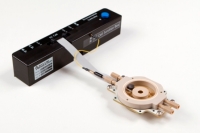March 10, 2011 — Asylum Research, scanning probe and atomic force microscopy (SPM/AFM) technology provider, launched the Electrochemistry Cell (EC Cell) for its MFP-3D AFMs. The EC Cell is a versatile platform for electrochemical experiments combined with AFM imaging, accommodating samples (working electrodes) including metal cylinders, flat conducting samples, and even conducting thin films on insulating substrates.
 The platform enables studies of deposition, oxidation, corrosion, and mass transfer of metals and other materials. Nanoscale topographical changes can be precisely monitored in situ as induced by electrochemical reactions. The cell provides for heating from ambient to 60°C (optional) and can be operated in a fully sealed configuration.
The platform enables studies of deposition, oxidation, corrosion, and mass transfer of metals and other materials. Nanoscale topographical changes can be precisely monitored in situ as induced by electrochemical reactions. The cell provides for heating from ambient to 60°C (optional) and can be operated in a fully sealed configuration.
Asylum Research developed the EC Cell in collaboration with Professor Richard Compton of the University of Oxford (UK) to conduct electrochemical experiments and develop images of the changes occurring to the sample, said Dr. Maarten Rutgers, product manager.
The MFP-3D offers independent piezo positioning in all three axes, combined with low noise closed-loop feedback sensor technology. The MFP-3D enables top and bottom sample viewing and easy integration with most commercially available inverted optical microscopes.
Asylum Research is a technology leader in atomic force and scanning probe microscopy (AFM/SPM) for both materials and bioscience applications. Learn more at www.AsylumResearch.com.
Follow Small Times on Twitter.com by clicking www.twitter.com/smalltimes. Or join our Facebook group

